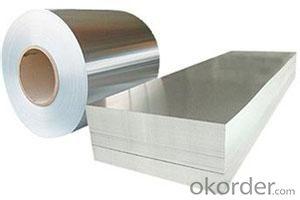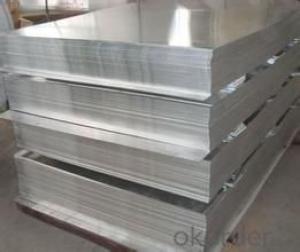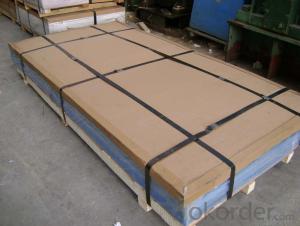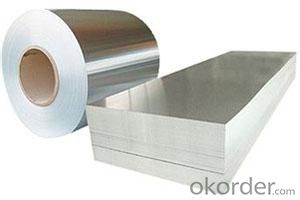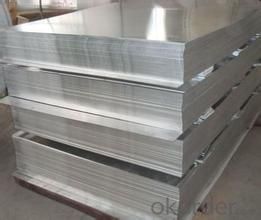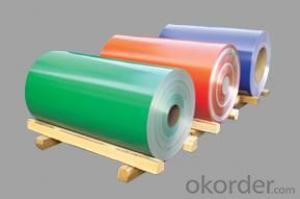Mill-Finished Aluminum Teal Sheets, Strips, and Plates Hot Wholesale in China
- Loading Port:
- China Main Port
- Payment Terms:
- TT OR LC
- Min Order Qty:
- -
- Supply Capability:
- -
OKorder Service Pledge
OKorder Financial Service
You Might Also Like
Aluminium is a relatively soft,durable, lightweight, ductile and malleablemetal with appearance ranging from silvery to dull gray,depending on the surface roughness. It is nonmagnetic and does not easilyignite. A fresh film of aluminium serves as a good reflector (approximately92%) of visible light and an excellent reflector (as much as98%) of medium and far infrared radiation. The yield strength of pure aluminium is 7–11 MPa,while aluminium alloys have yield strengths ranging from200 MPa to 600 MPa. Aluminium has about one-third the density and stiffnessof steel. It iseasily machined,cast, drawn and extruded.
Alu Plate
Alloy: AA1050, 1060, 1100, AA3003, 3005, 3015, 5052, 5754, 5083,8011,etc
Temper:H14/16/18/22/24/32,HO etc.
Thickness:0.2mm—100mm
Width:100mm—2300mm (Can be slitted)
Application: Foil stock, Circles, Roofing, Canstock, Marine plate,Anti-sliperypurpose in vehicles, packing and appliance.
Features:
1. Excellent quality of products
2. Quick delivery
3. Best service to clients
4. BV,SGS avalible
5. No buckle o waveness
6. Tension leveling
7. Certificate of Origin
8. Form A,E
Packaging Detail: Carton ,Wooden pallet with plastic protection packing,standard seaworthy packing or as your request.
ProductionCapacity:
AnnualProduction capacity of 600,000 tons.
Products areexported to United States, Canada, U.A.E, Brazil, Mexico,Thailand, Vietnam,Nigeria etc, over 100 countries andregions all over the world.
Coveredfactories with full production line
CNBM aluminumproduction base is comprised of 18 aluminumannealers, 10 coil and foilmills, 4 continuous production lines, 2hot rolling production line and 3prepainted lines.
FAQ:
1. What is the form of payment?
Normally 30% TT, L/C
2. Type of quotation?
FOB, CFR, CIF
3. Port of loading?
Shanghai port
4. Delivery time?
30 day after client’s deposit
- Q: Explain the distinctions between aluminum sheets and aluminum foil in terms of thickness, uses, and properties.
- <p>Aluminum sheets and aluminum foil are both made from aluminum but differ in thickness and applications. Aluminum sheets are thicker and more rigid, typically used for construction, manufacturing, and as a packaging material. They offer better strength and durability. Aluminum foil, on the other hand, is very thin and flexible, commonly used for food packaging, cooking, and insulation. It's lightweight and has excellent heat and light reflection properties. Aluminum sheets are often anodized or coated for additional properties, while foil is valued for its purity and malleability.</p>
- Q: How do you prevent oxidation of exposed edges of aluminum sheets?
- There are several effective methods available to prevent oxidation of exposed edges on aluminum sheets: 1. Applying a protective coating is a commonly used approach. Various types of coatings like paint, lacquer, or specialized protective coatings designed for aluminum can be used. These coatings act as a barrier, preventing contact between the aluminum, oxygen, and moisture, which are the main causes of oxidation. 2. Anodizing is another option. This involves subjecting the aluminum sheets to an electrolytic process, creating a controlled and thick layer of oxide on the surface. This layer acts as a protective barrier against oxidation and offers additional benefits like improved corrosion resistance and enhanced aesthetics. 3. Proper storage and handling practices are crucial. Aluminum sheets should be kept in a dry and well-ventilated area, away from moisture and humidity. It is important to avoid placing them directly on the ground or other surfaces that may expose them to moisture. Additionally, wearing gloves during handling can minimize the transfer of oils from the skin, which can accelerate oxidation. 4. Regular cleaning and maintenance play a significant role in preventing oxidation. Removing dirt, grime, and other contaminants from the surface is essential as they contribute to the oxidation process. Mild soaps or detergents and a soft cloth or sponge can be used for cleaning. Thoroughly drying the sheets after cleaning is important to eliminate any remaining moisture. By implementing these preventive measures, the oxidation of exposed edges on aluminum sheets can be effectively minimized. This ensures their durability and preserves their aesthetic appeal.
- Q: I had this mandarin orange can. I filled the can with water. Four days later, there are quarter inch thick rust cakes on the inside of the can. Since I assume the can is aluminum, are these cakes aluminum oxide? If so, is it flammable and/or dangerous?
- Aluminum oxide is white and powdery in texture. It also takes a bit longer for aluminum to oxidize than iron, so I don't think you could have cakes of aluminum oxide in 4 days. If the cakes you are describing are reddish in color, then no, it is NOT aluminum oxide. It is good old fashioned ferric oxide- rust from iron.
- Q: What are the advantages of using aluminum sheets in the packaging industry?
- There are several advantages of using aluminum sheets in the packaging industry. Firstly, aluminum is a lightweight material, making it ideal for packaging applications. It is significantly lighter than other packaging materials such as steel or glass, which makes it easier to handle and transport. The lightweight nature of aluminum sheets also helps reduce shipping costs, as less fuel is required to transport the packaging materials. Secondly, aluminum sheets offer excellent barrier properties. They provide an effective barrier against oxygen, moisture, and light, which are common elements that can deteriorate the quality and freshness of packaged products. This barrier helps extend the shelf life of the packaged goods, ensuring that they reach consumers in optimal condition. Additionally, aluminum sheets are highly durable and resistant to corrosion. This durability ensures that the packaged products remain protected, even in challenging environmental conditions. Aluminum sheets are also resistant to temperature variations, ensuring that the packaging material remains intact and does not warp or deform. Moreover, aluminum is a highly recyclable material. Using aluminum sheets in the packaging industry promotes sustainability and reduces the carbon footprint. Aluminum packaging can be easily recycled and reused, reducing the need for virgin materials and minimizing waste. Furthermore, aluminum sheets offer versatility in terms of design and customization. They can be easily formed and shaped into various packaging formats, such as cans, trays, foils, and pouches. This flexibility allows packaging manufacturers to create innovative and attractive packaging solutions that cater to the specific needs and preferences of different industries and consumers. Overall, the advantages of using aluminum sheets in the packaging industry include its lightweight nature, excellent barrier properties, durability, recyclability, and versatility. These benefits make aluminum sheets a preferred choice for packaging manufacturers, ensuring the protection, preservation, and appeal of packaged products.
- Q: This question asks for methods to maintain a smooth and even surface finish on an aluminum sheet after it has been installed.
- <p>To ensure a smooth and even surface finish on an aluminum sheet after installation, follow these steps: 1. Choose high-quality aluminum sheets with a consistent thickness and surface texture. 2. Use appropriate cutting and shaping tools to avoid scratches and deformations. 3. Clean the surface thoroughly before installation to remove any dirt or debris. 4. Apply a protective coating or sealant if necessary, following the manufacturer's instructions. 5. Install the aluminum sheet using proper techniques and hardware to avoid warping or unevenness. 6. Inspect the surface regularly for any signs of wear or damage, and address them promptly. By following these steps, you can maintain a smooth and even surface finish on your aluminum sheet after installation.</p>
- Q: What are the standard thicknesses for aluminum sheets utilized in construction?
- <p>Yes, there are standards for the thickness of aluminum sheets used in construction. These standards vary by country and application. In the United States, the Aluminum Association sets standards, such as AA 3003-H14, which is commonly used in construction for thicknesses ranging from 0.020 to 0.250 inches. In Europe, EN 485-2 covers the specifications for aluminum sheet thicknesses. Thicknesses can range from 0.4mm to 6.0mm, depending on the specific requirements of the construction project. It's important to consult the relevant standards for the region and application to ensure compliance and proper material selection.</p>
- Q: Can aluminum sheets be used for sound insulation?
- Yes, aluminum sheets can be used for sound insulation to some extent. While aluminum is not the best material for soundproofing compared to others like rubber or foam, it can still provide some level of sound insulation when used correctly. Aluminum sheets can be installed as a barrier or partition in walls, ceilings, floors, or other surfaces to reduce the transmission of sound waves. However, it is important to note that additional soundproofing materials or techniques might be necessary to achieve optimal results.
- Q: Can aluminum sheets be used in construction?
- Construction can indeed utilize aluminum sheets. Aluminum, a versatile and lightweight material, possesses numerous advantageous properties for construction purposes. Its corrosion resistance allows for both indoor and outdoor applications. Moreover, aluminum sheets exhibit a high strength-to-weight ratio, granting them durability and strength while remaining relatively lightweight. This characteristic proves advantageous in construction projects where weight is a consideration. Furthermore, aluminum is non-toxic and highly recyclable, making it an environmentally conscious option. When combined with its aesthetic appeal and ease of fabrication, aluminum sheets become a favored choice for a variety of construction applications such as roofing, cladding, wall panels, window frames, and more.
- Q: Are aluminum sheets suitable for use as materials for windows and doors?
- <p>Yes, aluminum sheets can be used for windows and doors. They are known for their durability, low maintenance, and resistance to corrosion and weathering. Aluminum windows and doors are energy-efficient, lightweight, and offer excellent security. They can also be easily customized in terms of size and design, and are often used in modern architecture for both residential and commercial buildings.</p>
- Q: Explain how the use of aluminum sheets can impact the visual appeal of a building.
- <p>Aluminum sheets can significantly enhance the aesthetic appearance of a building due to their versatility, durability, and modern look. They offer a sleek and contemporary design, available in various colors, finishes, and textures, allowing architects to create unique and visually striking facades. Their resistance to corrosion and weathering ensures that the building maintains its appearance over time, while their lightweight nature can contribute to innovative architectural designs. Additionally, aluminum sheets can be easily shaped and cut, enabling complex and intricate designs that add to the visual appeal of the structure.</p>
Send your message to us
Mill-Finished Aluminum Teal Sheets, Strips, and Plates Hot Wholesale in China
- Loading Port:
- China Main Port
- Payment Terms:
- TT OR LC
- Min Order Qty:
- -
- Supply Capability:
- -
OKorder Service Pledge
OKorder Financial Service
Similar products
Hot products
Hot Searches
Related keywords
